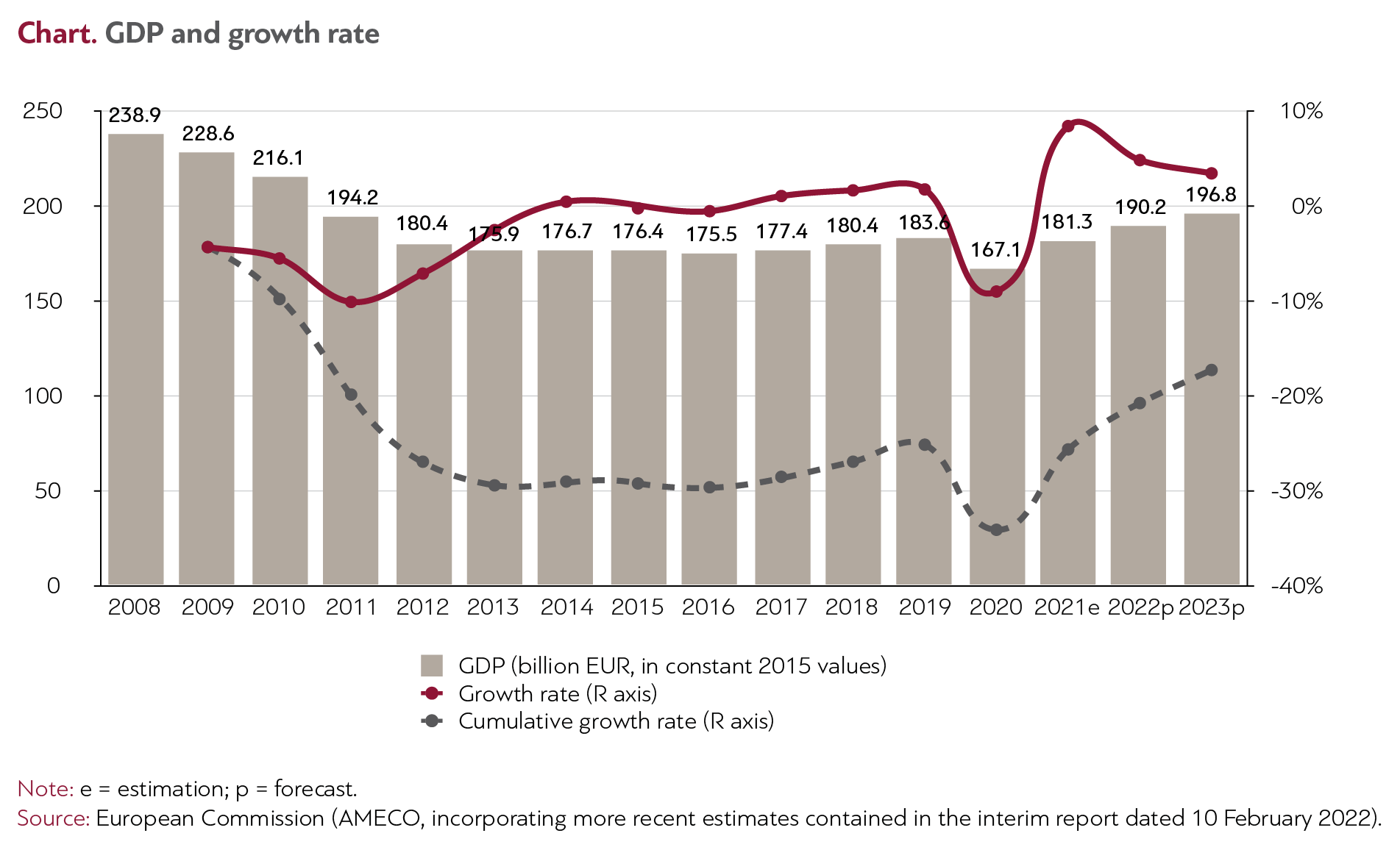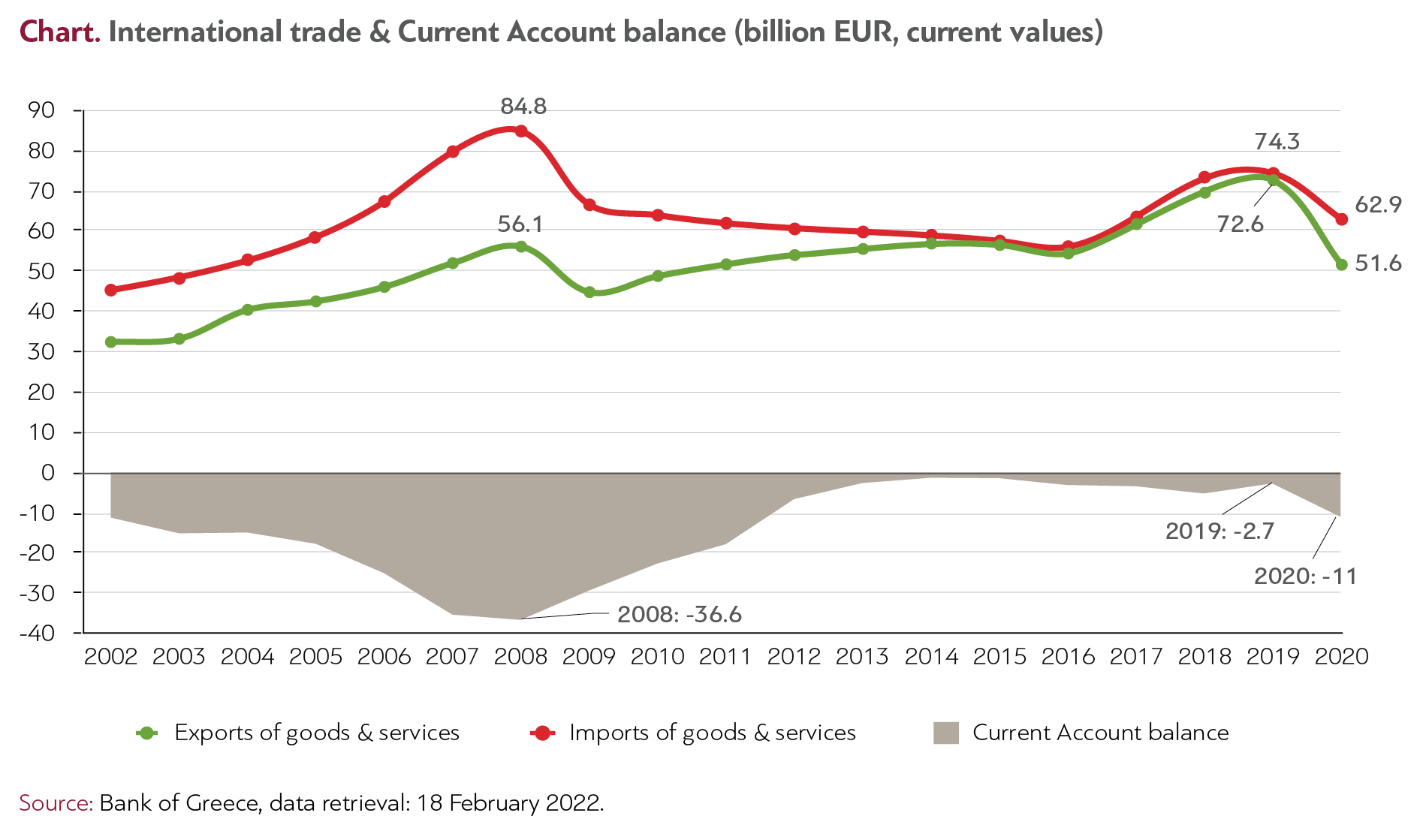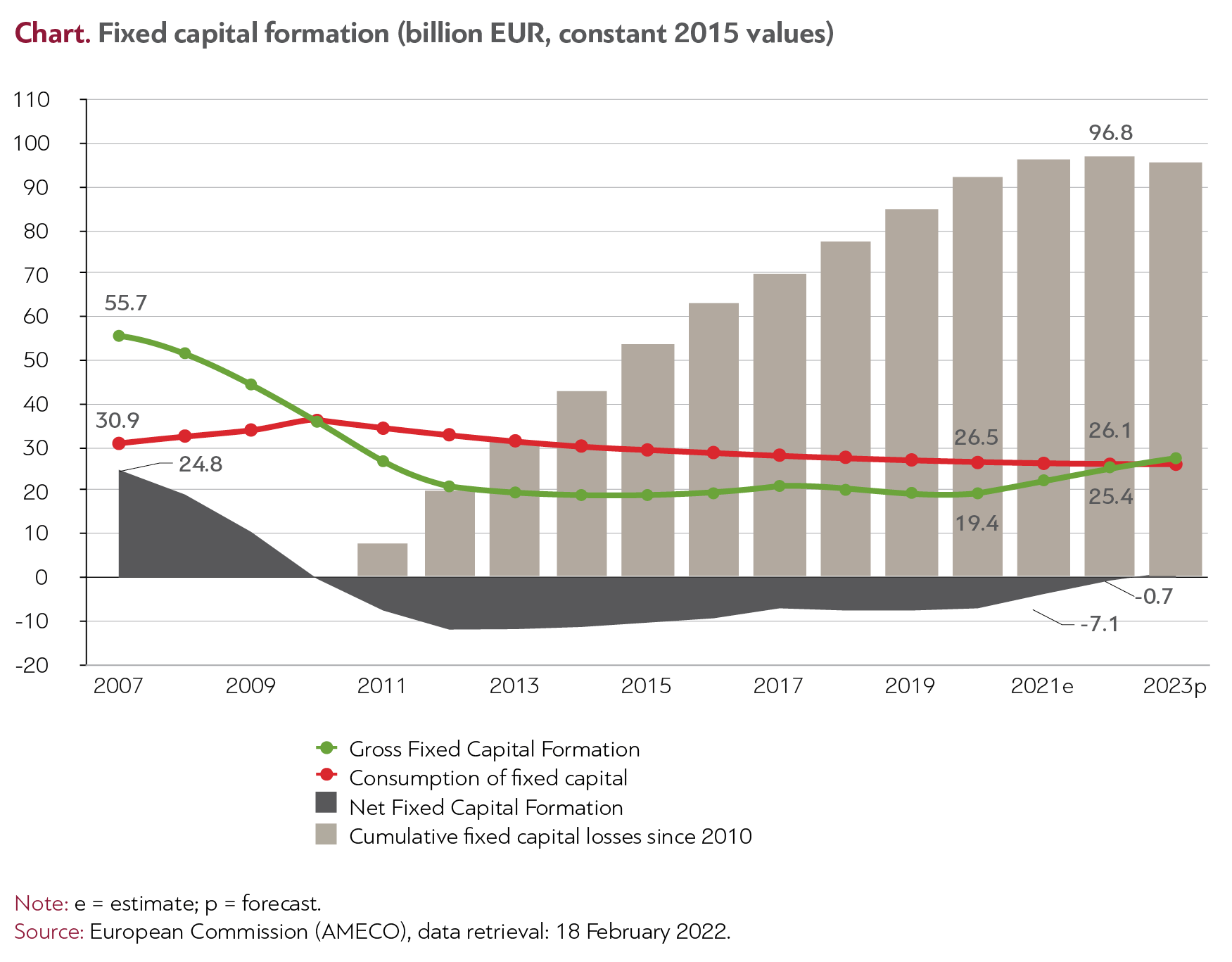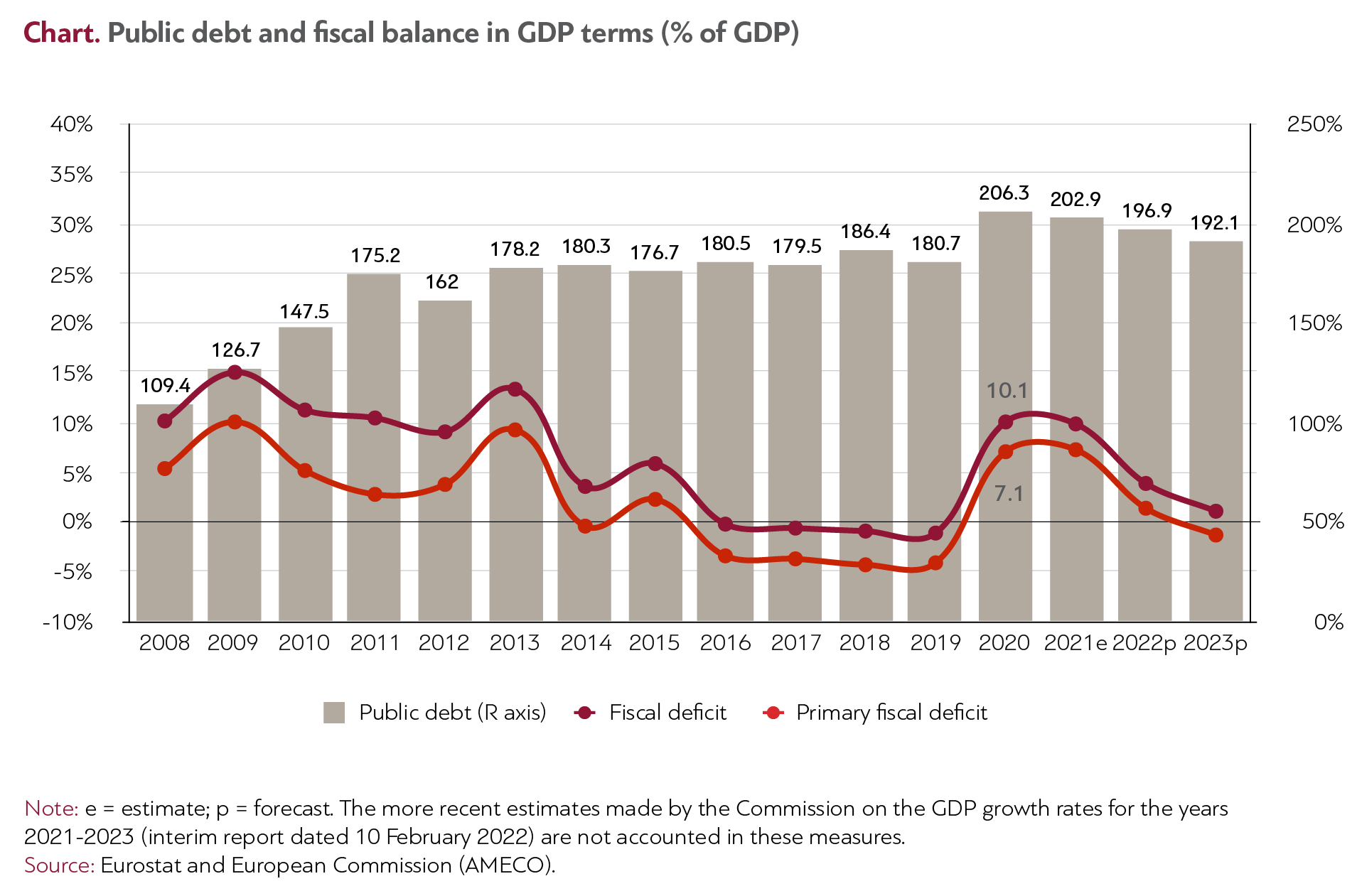Today, Greece, along with the rest of the world, finds itself in the throes of a global pandemic crisis that has also caused a concurrent global economic crisis. Both supply and demand suffered negative shocks brought about by the pandemic, which resulted in a deep and sharp recession in 2020 for all the economies of the world, with an even more profound impact on economies more exposed to foreign trade. That said, it seems that since the mid-2021 our country, as well as the world economy, have been recovering from this recession, although there are still significant uncertainties regarding the course of the pandemic crisis or due to a variety of new sources of risk, such as the energy crisis, the global wave of inflation and the war in Ukraine.
You can read and download the full report in Greek here
Nevertheless, it would be wrong to assume that, once the pandemic is over and the above uncertainties have been dealt with, the Greek economy will return to a sound state, since this was really not the case even before the pandemic. When the pandemic struck in early 2020, our economy was at -25.2% of its 2008 GDP with no particular growth impetus. The Greek economic crisis originated indeed in the global 2007-2008 financial crisis, but it was attributed to significant fundamental weaknesses of the Greek economy that had accumulated over time, and it deteriorated considerably because of -admittedly- extremely poor political-economic handling, resulting in one of the deepest and more lasting economic crises a developed economy had experienced in modern history. Many of these weaknesses have not yet been properly addressed despite the considerable efforts that have been made. In addition, the very depth of the recession and its duration has been hampering the economy's recovery potential, as due to high and/or lasting under-employment, the resources available to the Greek economy have, on the one hand, been degraded and, on the other, have been motivated to move elsewhere.

One of the Greek economy's greatest "open wounds" is its historic difficulty to at least even up its Current Account balance (CA), which has remained in deficit since 1974. Keeping the CA in deficit, which is indicative of the Greek economy's historic inability to become competitive, represents a highly unsustainable fundamental instability since it requires equivalent surpluses in the past or in the future. Achieving surpluses in CA is far from an easy task, as it requires either to considerably improve the competitiveness of Greek businesses or significantly reduce consumption expenditure, with all the consequences that this entails for social welfare. The considerable improvement in the CA outlook seen during the crisis was in principle achieved thanks to a contraction in consumption and imports due to the shrinking available income, while a rise in exports in recent years (if the effect of the pandemic is not taken into account), a clear sign of improved competitiveness, is offset by a slight increase in imports, as the available income is recovering. So, there is a need for even faster improvement in the competitiveness of Greek businesses, which requires an increase in resources productivity and production performance at an initially higher rate and then at a rate at least equal to the rest of the world.

The major problem with the way the Greek economic crisis was handled was the extremely steep and lasting reduction in investments, which resulted in a significant loss of a part of physical capital stock since investment expenditure over the last 11 years has not even been enough to offset its consumption. It should be pointed out that sustainable growth cannot be achieved unless this haemorrhaging of physical capital comes to an end. Only when there is an adequate rise in investments, so that the stock of physical capital starts increasing again, will we be able to see a rise in the potential GDP and labor productivity, and, hence, a sustainable increase in the GDP, employment, and real wages.

The allocation of significant European funds from the Recovery and Resilience Facility, in conjunction with the new NSRF and the CAP, over the coming years, is a historical opportunity to not only fully cover the investment gap that has been prevalent for more than a decade, if they are entirely channeled to investments, but also to seek a redirection of the Greek economy towards a new growth model able to provide it with a continuous and sustainable impetus for the decades to come. In this context, it is appropriate to secure the highest strategic targeting both in allocating these funds and, generally, in implementing the country's investment policy. Such strategic targeting must first and foremost involve focusing on labor-intensive industries; that is, to assign a relatively higher priority and provide stronger incentives for investments in business activities based more on labor compared to the other factors of production. In this way, every unit of additional physical capital will give rise to more new jobs, resulting in a faster reduction in the stock of the untapped resource called unemployment. Moreover, dedicated care needs to be taken to relatively boost investments able to contribute more to the competitiveness and outward orientation of the Greek economy.
Major opportunities and future challenges for the Greek economy go hand in hand with equally major risks and uncertainties. First and foremost, the pandemic is not over yet, and despite its decreasing impact on world economies, we do not know with certainty what the future has in store for us. Second, due to the pandemic crisis, but also because of other pandemic-independent factors, energy prices have been skyrocketing since mid-2021 in conjunction with doubts as to Europe's energy security. Energy is a virtually irreplaceable intermediate good used to produce all other goods and, therefore, it qualifies as the single most important input of the economy. Persistently high rates of energy poverty in Greece make it necessary to take targeted measures to support vulnerable energy consumers. That said, the benefit gained by such measures is limited, as they cannot protect weak households from the indirect effects of the energy crisis. As the cost of energy affects every link of every value chain, huge rises in energy prices are inevitably passed on to the price of final and intermediate goods. Hence, there is a need to restrict the overall spread of the "virus" of exorbitant energy costs among the economic fabrics and, in particular, the productive economy.
Third, soaring energy costs have been compounded by additional inflationary factors that have led to skyrocketing inflation on a global scale. Despite the fact that a moderate amount of inflation, of about 2-3%, would probably have beneficial consequences for the Greek economy, which has practically maintained a stable price level since 2011, the excessive current inflation in Greece and the Eurozone entails more risks in addition to the challenges it brings about for the real income of Greek citizens. The Greek economy is struggling to become more competitive in real terms, which implies that it is absolutely necessary to keep inflation in Greece lower than the Eurozone average. However, the high level of inflation in the Eurozone is putting pressure on the ECB to mitigate or even suspend altogether the clearly expansive monetary policy it has been following in recent years. This would have obvious negative repercussions for the growth rate of all Euro economies, but in Greece, there would be additional problems caused by a rise in the demanded returns on its debt, in particular at a time when our country runs the risk of missing the opportunity to join ECB's regular QE program while it still applies.
Finally, a number of factors, such as the pandemic and the crisis in the Greek-Turkish relations, have led to a significant rise in public spending which, in combination with limited financial activity and reduced public revenue, have resulted in an unavoidable rise in public debt. The high level of the Greek debt increases, on the one hand, the risk of the ECB policy switching to higher interest rates and suspending or limiting the purchase of sovereign securities, and, on the other, it represents an inherent risk for the Greek economy that limits its growth perspectives.

The best option for the Greek economy in order to address its debt issue is to "rush forward" by achieving considerable and sustainable growth rates over the coming years. In this way, the need for immediate reforms becomes even more pressing so that our economy can rid itself of its deeply rooted weaknesses once and for all.
You can read and download the full report in Greek here:
